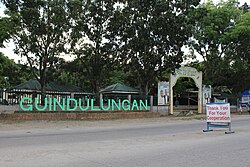Guindulungan
Guindulungan, officially the Municipality of Guindulungan (Maguindanaon: Ingud nu Guindulungan; Iranun: Inged a Guindulungan; Tagalog: Bayan ng Guindulungan), is a — municipality in the province of Maguindanao del Sur, Philippines. According to the 2020 census, it has a population of 24,933 people.[3]
Guindulungan | |
|---|---|
 Municipal Compound | |
|
| |
OpenStreetMap | |
| Country | Philippines |
| Region | Negros Island Region |
| Founded | March 31, 2003 |
| Barangays | (see Barangays) |
| Government | |
| • Mayor | Midpantao M. Midtimbang Jr. |
| • Vice Mayor | Datu Guiadzali M. Midtimbang |
| • Representative | Mohamad P. Paglas Sr. |
| • Municipal Council | Members |
| • Electorate | voters (?) |
| Highest elevation | 382 m (1,253 ft) |
| Lowest elevation | 4 m (13 ft) |
| Economy | |
| • Poverty incidence | <div style="background-color: Expression error: Unexpected > operator.; width: %; height: 100%;"> |
| • Revenue | ₱ |
| • Assets | ₱ |
| • Expenditure | ₱ |
| • Liabilities | ₱ |
| Service provider | |
| • Electricity | — |
| Time zone | UTC+8 (PST) |
| PSGC | PSGC unknown |
It was created under Muslim Mindanao Autonomy Act No. 139 on March 31, 2003, carved out of the municipality of Talayan.[4]
The first appointed mayor during its creation as a new municipality was Hadji Datu Antao Midtimbang, Sr., a well known religious leader who also served as mayor of Talayan and as vice governor of Maguindanao Province. The municipality is inhabited by 99% Maguindanaons.
Geography
Barangays
Guindulungan is politically subdivided into 11 barangays. Each barangay consists of puroks while some have sitios.
- Ahan
- Bagan
- Datalpandan
- Kalumamis
- Kateman
- Lambayao
- Macasampen
- barrio Muslim
- Muti
- Sampao
- Tambunan II
Climate
| Climate data for Guindulungan, Maguindanao | |||||||||||||
|---|---|---|---|---|---|---|---|---|---|---|---|---|---|
| Month | Jan | Feb | Mar | Apr | May | Jun | Jul | Aug | Sep | Oct | Nov | Dec | Year |
| Mean daily maximum °C (°F) | 31 (88) |
32 (90) |
32 (90) |
32 (90) |
31 (88) |
29 (84) |
29 (84) |
29 (84) |
30 (86) |
30 (86) |
30 (86) |
31 (88) |
31 (87) |
| Mean daily minimum °C (°F) | 21 (70) |
21 (70) |
21 (70) |
23 (73) |
23 (73) |
23 (73) |
23 (73) |
23 (73) |
23 (73) |
23 (73) |
23 (73) |
22 (72) |
22 (72) |
| Average precipitation mm (inches) | 30 (1.2) |
19 (0.7) |
25 (1.0) |
24 (0.9) |
64 (2.5) |
88 (3.5) |
102 (4.0) |
105 (4.1) |
76 (3.0) |
82 (3.2) |
60 (2.4) |
26 (1.0) |
701 (27.5) |
| Average rainy days | 9.8 | 8.5 | 11.3 | 11.9 | 21.6 | 23.9 | 24.1 | 24.5 | 20.9 | 21.8 | 16.8 | 11.8 | 206.9 |
| Source: Meteoblue (modeled/calculated data, not measured locally)[5] | |||||||||||||
Demographics
| Year | Pop. | ±% p.a. |
|---|---|---|
| Source: Philippine Statistics Authority[6][7][8] | ||
Economy
Poverty Incidence of
| Lua error in Module:Chart at line 301: bad argument #1 to 'max' (number expected, got string). |
References
- ^
- ^ "2015 Census of Population, Report No. 3 – Population, Land Area, and Population Density" (PDF). Philippine Statistics Authority. Quezon City, Philippines. August 2016. ISSN 0117-1453. Archived (PDF) from the original on May 25, 2021. Retrieved July 16, 2021.
- ^ 3.0 3.1 Census of Population (2020). Table B - Population and Annual Growth Rates by Province, City, and Municipality - By Region. Philippine Statistics Authority. Retrieved 8 July 2021.
- ^ "Muslim Mindanao Autonomy Act No. 139; An Act Creating the Municipality of Guindulungan out of the Mother Municipality of Talayan in the Province of Maguindanao, Appropriating Funds Therefor, and for Other Purposes" (PDF). Regional Legislative Assembly, Autonomous Region in Muslim Mindanao. Retrieved 27 January 2016.
- ^ "Guindulungan, Maguindanao : Average Temperatures and Rainfall". Meteoblue. Retrieved 19 January 2019.
- ^ Census of Population (2015). Highlights of the Philippine Population 2015 Census of Population. Philippine Statistics Authority. Retrieved 20 June 2016.
- ^ Census of Population and Housing (2010). Population and Annual Growth Rates for The Philippines and Its Regions, Provinces, and Highly Urbanized Cities (PDF). National Statistics Office. Retrieved 29 June 2016.
- ^ Censuses of Population (1903–2007). Table 1. Population Enumerated in Various Censuses by Region: 1903 to 2007. National Statistics Office.
- ^ "Poverty incidence (PI):". Philippine Statistics Authority. Retrieved December 28, 2020.
External links
- Guindulungan Profile at the DTI Cities and Municipalities Competitive Index
- MMA Act No. 139 : An Act Creating the Municipality of Guindulungan in the Province of Maguindanao
- String Module Error: String subset index out of range000®code=String Module Error: String subset index out of range&provcode=String Module Error: String subset index out of range Philippine Standard Geographic Code
- 2000 Philippine Census Information
- Local Governance Performance Management System Archived 2016-03-03 at the Wayback Machine
